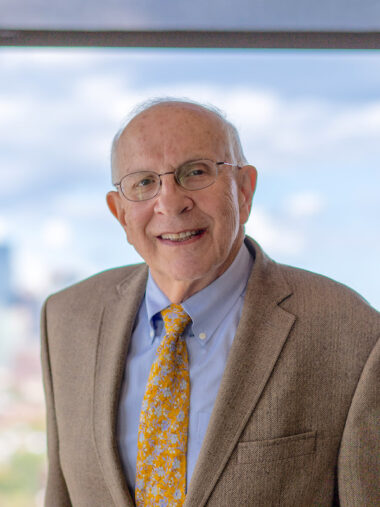
Larry Finkelstein
- Khoury Professor Emeritus
- BS in Mathematics ’65, The City College of New York; MS in Mathematics ’68, University of Michigan; PhD in Pure Mathematics ’70, University of Birmingham, United Kingdom
- Dean of Khoury College 1993-2014
Today, the Khoury College of Computer Sciences holds national prominence as one of the premier colleges for computer science and information science. However, Larry Finkelstein, who served as Khoury’s Dean from September 1993 to July 2014, remembers the early days when he joined the College as a professor in 1983 in its second year: “It was an exciting time to join the College. We were still in the process of inventing all of the administrative structures and curriculum from scratch, to ensure that the surge of students the University anticipated in the new field of computer science received a high-quality education.”
In fact, it was this “sense of being part of a startup” that allowed and encouraged ingenuity in how the College was structured and shaped the revolutionary directions in which Finkelstein helped steer the school when he became dean. This was especially critical during the national crisis of enrollments in computer science beginning in 1991. “At the time I became Dean [in 1993],” Finkelstein says, “We were…functioning as a very good department, but we weren’t leveraging the fact that we were a separate college to shape our own future and to have a strategic impact on educational programs throughout the University.”
Khoury College’s growth and strong national reputation are the result of the strategic decisions made during this difficult time. These decisions led to an expansion from the core set of computer science majors to a broader field of subjects, including a new focus on interdisciplinary education and research. The highlight of the interdisciplinary focus was the innovative combined majors program; Finkelstein worked closely with Richard Rasala to create a template for developing the programs. And as faculty from the different colleges worked together on the requirements for each program, Larry championed their efforts with his fellow deans to build trust and support the culture of collaboration. In 2001, the program launched with three combined computer science majors with Math, Physics, and Cognitive Psychology. Today, Khoury boasts 60 combined degree programs, and more than 60% of Khoury undergraduate students participate in these programs.
It was an exciting time to join the College. We were still in the process of inventing all of the administrative structures and curriculum from scratch, to ensure that the surge of students the University anticipated in the new field of computer science received a high-quality education
Additional achievements during Finkelstein’s tenure included the college’s renaming in 2002 as the College of Computer and Information Science (CCIS) to reflect an increased focus on information as a foundation of the computing discipline. In 2004, CCIS moved into the brand new, state-of-the-art (and award-winning) West Village H building. Through strategic hires, Khoury College made Northeastern a national leader in the core fields of programming languages and cybersecurity. In 2005, Agnes Chan led the creation of the multidisciplinary Institute of Information Assurance (IIA) and was later responsible for having Northeastern be one of only 13 universities to earn the designation as a National Center of Academic Excellence in Cyber Operations by the National Security Agency (NSA). Under Finkelstein’s tenure Khoury also led the development of interdisciplinary programs in Health Informatics, Network Science, and Data Science, areas of research critical to the solution of major societal problems.